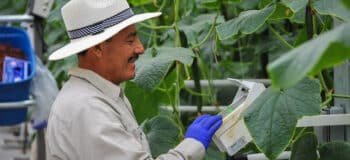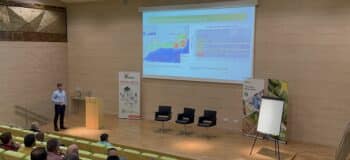18 May 2020
“Our expertise and technologies are needed now more than ever”

Horticultural development in China is showing encouraging signs of recovery. Since the easing of coronavirus lockdowns and restrictions, work life is slowly picking up where it left off at the start of the outbreak. Likewise, the team of Ridder China has also gone back to work, albeit with some adjustments, and they are positive and optimistic about the future. Ridder China’s GM Fulco Wijdooge: “The awareness about food safety and locally grown produce has reached a new stage. Our expertise and technologies are needed now more than ever.”
Two-months in “lockdown”
It was late February that the colleagues of Ridder China could finally return to their offices in Shanghai again. According to Fulco Wijdooge, General Manager at Ridder China, it was good to have the team back together and partially return to work again from their Chinese headquarters. “At the moment of the outbreak we were in the middle of completing some important projects and preparing to take a break for the Chinese New Year in late January. It eventually became a very long break and the whole country and economy came at standstill. We are happy that we can get back to work again, picking up where we had left.”
Photo: Aerial view of the Evergrande greenhouse project in Wuhan. As a result of the coronavirus outbreak, work was discontinued, and on-site support, training and commissioning were no longer possible.
Project in Wuhan
The corona pandemic brought a sudden halt to the dynamic development of the many horticulture projects that Ridder and their local partners were working on in China. One of them was in Wuhan, the epicenter of the coronavirus outbreak. Ridder had just delivered climate control computers and software for the 30-hectare greenhouse project of Wuhan Evergrande, carried out by Dutch greenhouse builder KUBO. Suddenly the work was discontinued, and on-site support, training and commissioning were no longer possible. “Even though we are not yet traveling like we used to, we are looking forward to finalizing these works and carrying out new projects. We might need to do things a little differently than what we are used to, with remote technologies and virtual support, but we will do our utmost to provide every assistance needed. This reinforces our conviction to have a capable local service team to provide engineering and cultivation support.”
Archive Photo: Staff of the 26-hectare Kaisheng Haofeng Lingcheng greenhouse receive training from Ridder on cultivation and climate management. Ridder supplied the tomato grower with climate control, fertigation, water treatment and drive systems.
Positive trend
Wijdooge is confident about the situation in the Chinese market and the potential for greenhouse technology. “The Chinese government has always been very supportive of developing the agriculture sector. They are very committed to their five-year plan in which the modernization of the agriculture and horticulture sectors is an important pillar. This commitment will only increase as the coronavirus has led to a renewed focus on self-sufficiency. Advancing the implementation of scale enlargement and modernization of agriculture and introducing less restrictive regulations on policies for protected horticultural land are two of the positive trends that we are currently seeing.”
Large-scale projects
According to Wijdooge, these positive trends were already evident before the coronavirus crisis. “Of course, things have been on hold for a while and the first quarter can be regarded as lost, yet we have high hopes that the developments will continue as a result of the commitment from the Chinese government and investors in the horticultural sector. Albeit with some delays, the development of the Evergrande project in Wuhan will be resumed and there are few more large projects in the pipeline in Yunnan, Henan and Jiangsu. In addition to this we are currently delivering irrigation systems, climate control and drive systems for a 14-hectare greenhouse project that our partner Dalsem is building for CNBM in Shandong. ”
Archive Photo: To ensure successful projects, Ridder employees with a degree from Wageningen University provide technical instruction and training on plant physiology.
Local manufacturing of adaptive technology
“Ridder is responding to the ambitions of the Chinese horticulture industry by expanding its activities in China. Ridder China has recently obtained a renew business license which will allow us in the future to manufacture local products specifically for the Chinese market. “By manufacturing our solutions locally in China, we will be able to adapt our systems to Chinese circumstances even better”, Wijdooge said. “Also, it will help us to provide more effective training and support to our partners and customers.”
The local production of climate and irrigation technology will enable Ridder to tailor some of their systems to very specific requirements of Chinese growers. “Besides the large-scale greenhouse projects we are involved in, we also have many customers with small-scale and less high-tech greenhouses who are also looking to improve their production with smart climate controllers and automated irrigation systems. These growers require a less complex system and want to make a smaller investment. Local manufacturing in China will allow us to respond to their specific needs.”








